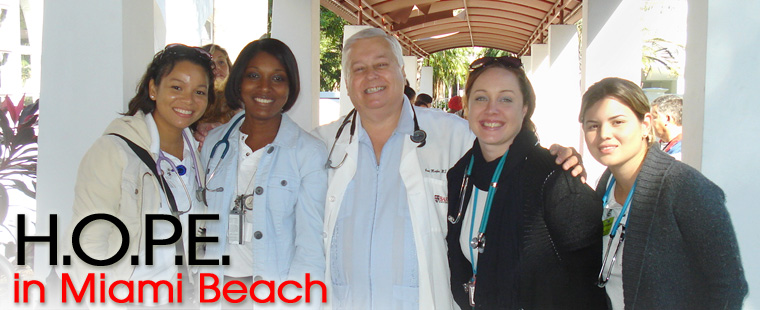Gene Majka, a certified adult nurse practitioner, came to Barry in the spring of 2002 to teach and oversee the community health nursing course. At the time, Barry only had 10 students a semester and two clinical sites. He has since added 12 more sites throughout South Miami-Dade changing the way scores of nursing students practice their profession.
Originally from Chicago, Majka completed his master’s research study on the homeless at DePaul University. He also created and implemented a primary clinic in an emergency shelter in Chicago where he spent five years attending homeless men.
As an assistant professor at Barry, Majka teaches community, public health, and mental health nursing to dozens of students a year and is an active member in many community organizational committees where he serves the homeless as well as the migrant workers of South Florida.
Majka received the Migrant Unsung Hero Award from the Migrant Health Network in Washington D.C. in September 2010. In 2012, he received the Florida Compact Community Educator of the Year Award in Tampa.
As the community coordinator for the nursing school, he obtains clinical sites for nursing students at places such as the Redlands Christian Migrant Association (RCMA), a non-profit childcare center in Homestead. The daycare provides early education for children of migrant farm workers and rural low-income families throughout South Dade.
Barry students remain at a site the entire semester, gaining in-depth knowledge of the culture and values of that particular community. By the end of the semester they also visit five different nonprofit, county or state agencies to get some exposure to services in other communities.
Majka says he was fortunate that he was able to receive exposure to community nursing at a time when it wasn’t necessarily in the forefront of nursing education, and he was doubly fortunate to find a profession that continues to give him such a sense of self-worth.
“The need for community nursing has always existed,” Majka noted. “In the 1990’s more than 90 percent of nurses worked in hospitals, now less than 60 percent of them do. There are other settings to work in; you see parish nurses, nurses working for insurance companies and community centers.”
At Barry, Majka is involved in smoking cessation studies in South Florida with his nursing colleagues and obtained several grants to support his community activities in Miami-Dade and Broward County with the poor and homeless population. He plans to extend his services and initiate health screening clinics in soup kitchens in Broward.
Most recently, Majka and his students participated at an event for H.O.P.E. in Miami Beach. The nonprofit, faith-based organization has worked to reduce homelessness in the City of Miami Beach since 2002. The H.O.P.E. Homeless Events are held on South Beach and provide breakfast, lunch, clothing, shoes, prescription eye glasses, hygiene products, nutritional products, haircuts, first aid, and HIV testing, among other services to the homeless.

